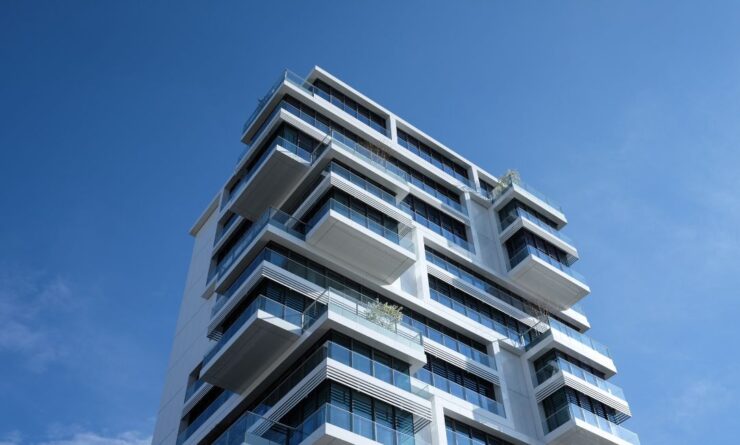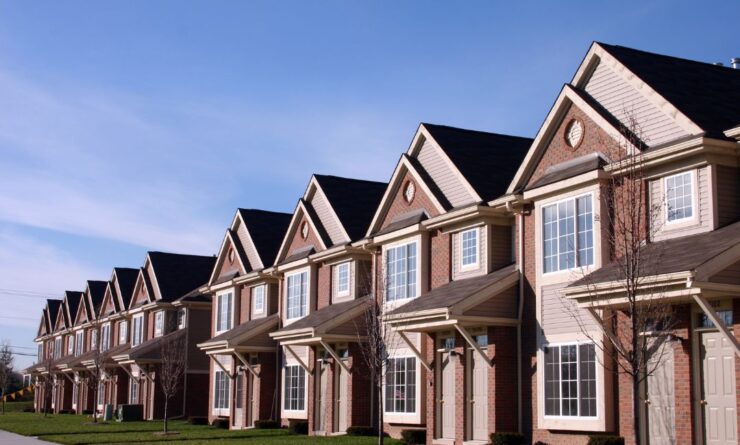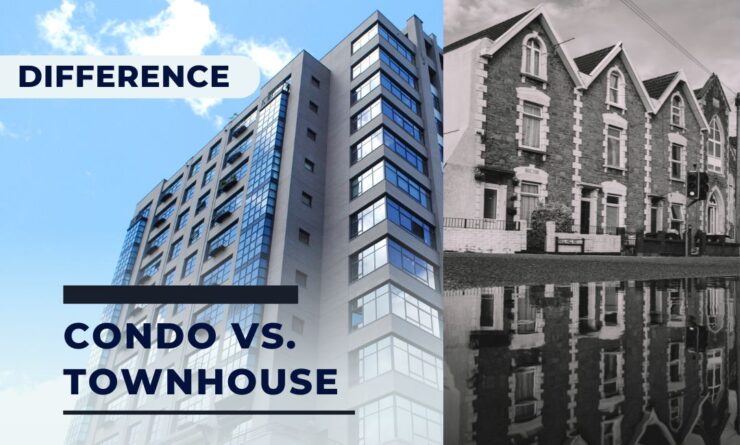Condo and townhouse living is gaining traction, especially in cities where everything is just a stroll away. Perhaps you’re a newbie in the home-buying scene looking for a prime spot without breaking the bank.
Or, you might be seeking a smaller space after years of managing a large property. Either way, the allure of condos and townhouses is undeniable.
You’re probably pondering: Is it worth the investment? Which is the better choice?
While you’re considering the financial implications of condos and townhouses, it’s also essential to understand how external factors, such as economic downturns, can influence housing prices. For a deeper dive into this topic, check out our article on Housing Prices During the Recession.
Let’s dive into the distinctions between condos and townhouses, and explore their advantages, disadvantages, and costs to help you decide!
What’s a Condo?
 A condo, short for condominium, is all about the ownership style. Think of condos as units in a building, much like apartments.
A condo, short for condominium, is all about the ownership style. Think of condos as units in a building, much like apartments.
The twist? You own the inside of your condo, unlike an apartment that you’d rent.
Outside your unit, everything is communal. Residents chip in fees to a homeowners association (HOA) which handles maintenance and insurance for shared spaces.
This encompasses the building’s exterior, gardens, and amenities like pools or community halls.
What’s a Townhouse?
 A townhouse, on the other hand, is defined by its design. It’s a multi-story home that shares walls with neighboring homes.
A townhouse, on the other hand, is defined by its design. It’s a multi-story home that shares walls with neighboring homes.
When you own a townhouse, you own everything – the inside, outside, and the land it stands on. This means more liberty in how you use your space, but also more upkeep.
While townhouses also have HOA fees like condos, these fees are primarily for communal facilities. The exterior maintenance of your townhouse?
That’s on you.
Costs of Owning a Condo vs. a Townhouse
When it comes to finances, townhouses generally have a steeper listing price than condos due to the extra space they offer. However, the upfront price tag isn’t the only factor.
Condo mortgages often come with higher interest rates compared to townhouse mortgages. But does this make townhouses the outright winner in terms of cost?
Not always. It’s essential to consider your preferences and total budget.
To truly understand the financial implications of owning either, consider home insurance, property taxes, and HOA fees.
Insurance for Condos and Townhouses
 In today’s market, lenders usually mandate homeowners insurance for mortgages, be it for a condo, townhouse, or standalone house. A comprehensive policy typically covers:
In today’s market, lenders usually mandate homeowners insurance for mortgages, be it for a condo, townhouse, or standalone house. A comprehensive policy typically covers:
- Damage repairs from events like fires, storms, etc.
- Replacement costs for stolen items.
- Liability coverage in case someone gets hurt on your premises and decides to sue.
For condos, you might only need to insure the interior and your possessions since the HOA often covers the building’s exterior. In contrast, townhouse owners might need a more extensive policy, covering both the interior and exterior of their home.
Homeowners Insurance for Condos
The homeowners’ insurance for your condo only covers the interior of your unit, so it’s much cheaper than insurance for a detached single-family home. Keep in mind, condo homeowners insurance only covers the spaces inside your unit.
For instance, if your building needs roof repairs after a bad storm, the HOA’s building insurance will cover it. But if you accidentally start a kitchen fire inside your condo?
You better have a homeowners insurance policy!
Homeowners Insurance for Townhouses
Homeowners insurance for townhouses provides the same interior coverage as condo insurance—plus it insures the exterior of your home and the land it sits on. Since homeowners insurance for a townhouse requires more coverage, it may cost more than homeowners insurance for a condo in the same area.
Property Taxes for Condos vs. Townhouses:
 Property taxes are inevitable for property owners. Generally, they are influenced by two main factors: the assessed value of your property and the local tax rate.
Property taxes are inevitable for property owners. Generally, they are influenced by two main factors: the assessed value of your property and the local tax rate.
Townhouses
When you own a townhouse, an assessor from the government evaluates its value. This assessment considers aspects like:
- The size of your home (square footage).
- The land you possess.
- The number of rooms.
- The neighborhood you’re in.
Once the value is determined, it’s multiplied by the local tax rate to calculate your annual property tax. Many mortgage lenders prefer combining your mortgage and property tax payments.
This spreads the tax payment across 12 months, preventing a large, one-time tax bill. The lender typically holds the tax amount in an escrow account and handles the payment to the government, offering you peace of mind.
Condos
Condo owners often enjoy a lower property tax compared to townhouse owners in the same locality. The reasons include:
- Condos generally have a smaller living space than townhouses.
- Property taxes for condos factor in shared spaces in the building. However, these costs are divided among all condo residents.
In essence, while both condos and townhouses come with property taxes, the amount and how it’s managed can differ. With condos, you’re often taxed for a smaller space and share the costs of communal areas.
In contrast, townhouse owners bear the full brunt of the taxes for their property and the land it occupies.
HOA Fees for Condos vs. Townhouses:
 An HOA, or homeowners association, is an organization that ensures the upkeep and standard of a community. They manage shared spaces and the residents contribute to the costs.
An HOA, or homeowners association, is an organization that ensures the upkeep and standard of a community. They manage shared spaces and the residents contribute to the costs.
Factors Influencing HOA Fees:
- Location: The city or region you’re in can significantly impact the HOA fees. For instance, a condo in Washington D.C. might have an HOA fee of around $400 per month, which is notably higher than the national median for condos at $290 per month.
- Specific Community: Even within the same city, HOA fees can vary wildly between different condo or townhouse communities. Some D.C. communities, for example, charge a staggering $3,500 a month for a three-bedroom condo.
- Cost of Living: Areas with a higher cost of living generally have higher HOA fees.
- Characteristics of the Property: The size, number, and age of the homes or units in the HOA can influence the fees. Larger or older properties might require more maintenance, leading to higher fees.
- Amenities and Services: HOAs that offer more amenities like swimming pools, gyms, or security services will typically have higher fees.
- Shared Spaces: The amount of communal space or land that residents share can also impact the fees. More shared spaces might mean more maintenance and, consequently, higher fees.
Condo HOA Fees Cover:
- Building Maintenance: This includes insurance and repairs for the entire building.
- Amenities: Condos often come with a range of amenities like gyms, pools, dog parks, parking spaces, and even rooftop lounges.
- Security: Enhanced security measures such as video surveillance, front desk personnel, parking attendants, and special access systems can be part of the package.
- Services: Regular services like trash collection and snow removal are typically included.
Townhouse HOA Fees Cover:
- Basic Maintenance: This usually involves landscaping, trash collection, and snow removal.
- Fewer Amenities: Townhouses might not offer as many shared amenities as condos, leading to lower fees.
- Exterior Maintenance: Since townhouse owners are responsible for their property’s exterior, the HOA doesn’t need to allocate funds for such repairs, resulting in potentially lower fees.
Pros and Cons of Living in a Condo vs. a Townhouse:
 Condos:
Condos:
Pros:
- Community Living: Condos offer a more communal environment. With shared amenities and common areas, you’ll frequently interact with neighbors, fostering a sense of community.
- HOA Assistance: The HOA manages services and maintenance for the building. They handle amenities, package deliveries, and other services, making life more convenient.
- Low Maintenance: With the HOA taking care of external repairs and landscaping, condo owners only need to maintain their unit’s interior.
Cons:
- Limited Privacy: Condos might not be ideal for those valuing solitude. With neighbors all around, it can sometimes feel crowded.
- HOA Dependence: A poorly managed HOA can lead to frustrations. Their decisions directly impact your living experience, and a dysfunctional HOA can be a significant drawback.
- Space Constraints: Condos typically offer less space than townhouses. Additionally, private outdoor activities might require reserving communal spaces, sometimes at an extra cost.
Townhouses:
Pros:
- More Space: Townhouses generally offer more interior space and often come with a private outdoor area.
- More Privacy: While still sharing some walls, townhouses provide more privacy than condos, especially if they’re end units.
- Ownership of Land: Owning the land gives you more freedom in terms of landscaping and exterior modifications.
Cons:
- Maintenance: Townhouse owners are responsible for the exterior upkeep, which can be time-consuming and costly.
- Potential HOA Issues: Like condos, townhouses can also have HOAs, and a poorly managed one can be problematic.
- Less Community Interaction: While townhouses are part of a community, the design might not promote as much interaction as condos.
FAQ
Are condos and townhouses generally better as investments than single-family homes?
The potential return on investment for condos, townhouses, or single-family homes varies based on market trends, location, and demand. In high-demand urban areas, condos might offer better ROI due to amenities and less maintenance.
Townhouses might be more appealing in suburban areas where people want more space but still want community living. Always research the specific market and consult with a real estate expert.
Can I rent out my condo or townhouse?
The ability to rent out your unit often depends on the rules set by the HOA. Some condos and townhouses have restrictions on rentals to maintain a sense of community.
Before purchasing, check the covenants, conditions, and restrictions (CC&Rs) of the property.
Is it easier to resell a condo or a townhouse?
Reselling can depend on various factors, including location, market demand, the condition of the property, and current real estate trends. Historically, single-family homes and townhouses might have a broader appeal due to more space and fewer restrictions.
However, in urban settings, condos can be in high demand.
How do reserve funds work with condos?
Reserve funds are collected by the condo association to cover major repairs and replacements in the future, such as roof replacements or elevator repairs. Part of the monthly HOA fee goes into this fund, ensuring the association has enough money for these large projects without resorting to special assessments.
Can I renovate my property?
For condos, interior renovations are usually allowed, but you’ll need to check the association’s rules. Structural changes or changes that impact the exterior or shared walls might require approval.
For townhouses, interior renovations are generally less restricted, but external changes, especially in a community with an HOA, will need approval.
How are disputes resolved in condo and townhouse communities?
Disputes are often initially addressed within the HOA or condo board. If not resolved, mediation or legal action might be necessary.
It’s crucial to be familiar with your community’s bylaws and procedures for handling disputes.
Epilogue
In the bustling urban landscapes of today, both condos and townhouses present attractive living options. Each comes with its unique set of benefits and challenges.
While condos offer a sense of community and reduced maintenance responsibilities, they might compromise on space and privacy. Townhouses, on the other hand, provide more room and autonomy but come with added maintenance duties.
Your choice between a condo and a townhouse should align with your lifestyle, financial situation, and long-term goals. Consider factors like HOA fees, property taxes, insurance costs, and the level of maintenance you’re comfortable with.
In the end, whether you lean towards the communal spirit of a condo or the spacious independence of a townhouse, ensure you make an informed decision. Engaging with a seasoned real estate professional can offer invaluable insights and guidance.













